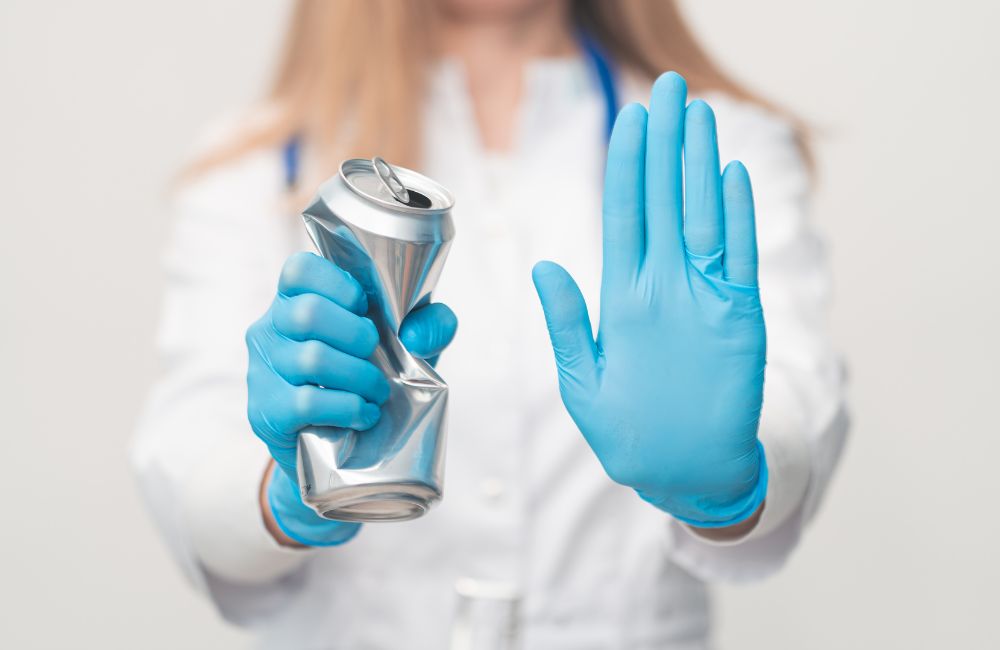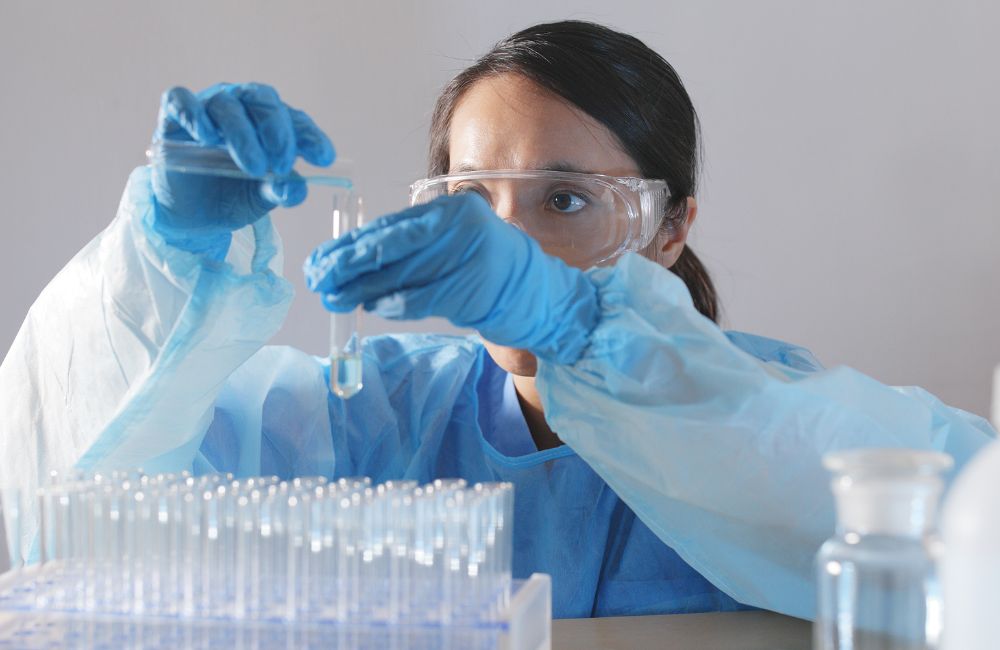
When employers and businesses implement drug and alcohol testing in the workplace, they reduce the likelihood of workplace accidents by 65%. Workplace safety should be a top priority for many businesses and employees who want to ensure their well-being. Your primary care doctor in Fairfield, CT, makes this possible by providing accessible pre-employment drug and alcohol tests.
Key Takeaways
What is Drug and Alcohol Testing?
Common Methods of Drug and Alcohol Testing
Drug and Alcohol Testing in the Workplace
How to Implement a Drug and Alcohol Testing Program
What to Expect During a Drug and Alcohol Test
What Happens When an Employee Tests Positive?
Primary Care Doctors in Drug and Alcohol Testing
Frequently Asked Questions

Drug and alcohol tests are diagnostic tools used to detect the presence of illicit substances, prescription medications, and alcohol in an individual’s system. These tests are crucial for maintaining a safe and productive workplace, ensuring employees are not under the influence while performing their duties.
By identifying individuals who may be impaired, employers can prevent accidents, reduce absenteeism, and promote a healthy work environment. Drug and alcohol testing also helps employers comply with legal and regulatory requirements, demonstrating their commitment to workplace safety and employee well-being.
Drug and alcohol tests can detect a wide range of substances, each of which can impair an employee’s ability to perform their job safely and effectively. The specific substances your primary care doctor tests in Fairfield, CT, can vary depending on the industry, company policy, and legal requirements.
Common Drugs Tested
1. Amphetamines (AMP): Includes drugs like Adderall and methamphetamine. These stimulants can increase alertness but also lead to dangerous levels of hyperactivity and aggression.
2. Cocaine (COC): A powerful stimulant that can cause euphoria, increased energy, and risky behavior, but also severe physical and psychological effects.
3. Marijuana (THC): Now legal in many places for medical or recreational use, marijuana can impair coordination, judgment, and reaction time.
4. Opiates (OPI): Includes heroin, morphine, and prescription painkillers like oxycodone. These substances can cause drowsiness, confusion, and slowed reaction times.
5. Phencyclidine (PCP): Known for causing hallucinations, disorientation, and violent behavior.
6. Benzodiazepines (BZO): Commonly prescribed for anxiety and sleep disorders, these can cause drowsiness and impair cognitive functions.
7. Barbiturates (BAR): Sedatives that can cause significant drowsiness and impair motor skills.
Common Alcohol Metabolites Tested
1. Ethyl Glucuronide (EtG): A direct biomarker of alcohol consumption that can be detected long after the alcohol has been metabolized.
2. Ethyl Sulfate (EtS): Another direct metabolite of alcohol, providing similar detection capabilities to EtG.

Understanding the various methods of drug and alcohol testing and what they measure is crucial for implementing an effective workplace safety program, which can also ensure the safety and well-being of employees.
Urine testing is the most common method for drug testing, which can detect recent drug use within the past few days. The test analyzes metabolites, which are the byproducts of drugs after they have been processed by the body.
Blood testing measures the actual presence of drugs or alcohol in the bloodstream. It provides information about current impairment and is typically used by a primary care doctor in Fairfield, CT, in post-accident situations or when impairment is suspected.
Saliva testing measures the presence of drugs in the saliva, which can indicate up to 48 hours of recent use.
Hair follicle testing analyzes hair samples to detect drug use over a longer period, typically up to 90 days. It measures drug metabolites embedded in the hair shaft and is highly accurate, especially for chronic drug use.
Breathalyzer tests measure the alcohol concentration in the breath, providing an estimate of blood alcohol concentration (BAC). They are commonly used in workplace settings and law enforcement to assess impairment.
A study on a railway transportation company showed that drug and alcohol testing prevents approximately 59% of accidents for train onboard workers, 72% for workers near trains, and 85% for white collars. By implementing a robust testing program with the help of a primary care doctor in Fairfield, CT, employers can enjoy these benefits, making their workplaces safer and more productive.
This section highlights the importance of drug and alcohol testing for several reasons:
Implementing a drug and alcohol testing program significantly reduces drug use among employees, which achieves its desired effects and helps maintain a safe workplace. Here’s a simple guide on how employers can start this process:
The first step is to create a clear policy that explains why the testing is done, who will be tested, and how often. It’s important to ensure everyone understands the rules and their consequences. For example, a primary care doctor in Fairfield, CT, might help a local construction company set up their policy to ensure it meets health standards.
Before starting any testing, employers must ensure everything they do follows local and federal laws. This might involve consulting with a lawyer to avoid legal problems later. For instance, DOCS Primary Care – Fairfield could guide Connecticut’s specific testing laws.
Employers should also train their management and staff on the new policies. This could include teaching them how to handle sensitive information and how to help employees who fail tests. For example, primary care doctors in Fairfield, CT, might offer training sessions on recognizing signs of substance abuse.
There are different kinds of tests for drugs and alcohol, like urine tests or breathalyzers. Employers need to choose the right one for their workplace. A primary care doctor in Fairfield, CT, can advise on the most suitable tests for different job roles.
Keeping test results private and ensuring the tests are accurate is very important. Employers might work with reliable labs or health clinics like DOCS Primary Care – Fairfield to ensure this.
Understanding what to expect during a drug and alcohol test can alleviate employee anxiety and ensure a smooth testing process. This section outlines a primary care doctor’s typical procedures in Fairfield, CT, from pre-test preparations to post-test result interpretation.
Drug and alcohol testing follows a standardized process to ensure accuracy and fairness. This process includes several key steps: pre-test procedures, sample collection and analysis, and post-test procedures.
✔ Urine Testing: Employees provide a urine sample in a private restroom. The sample is then sealed and labeled to prevent tampering.
✔ Blood Testing: A healthcare professional draws a blood sample, which is then processed in a laboratory.
✔ Saliva Testing: A swab collects a saliva sample from the employee’s mouth.
✔ Hair Follicle Testing: A small hair sample is cut from the employee’s head or body.
✔ Breathalyzer Testing: Employees blow into a breathalyzer device to measure blood alcohol concentration.

Addressing positive drug and alcohol test results is critical to maintaining workplace safety and fairness. This section outlines the immediate actions to take, the process of confirmatory testing, and the importance of providing support and counseling to employees. It also covers disciplinary actions, return-to-work policies, and ensuring a consistent and fair approach.
Primary care doctors in Fairfield, CT, have a significant role in administering and managing workplace drug and alcohol testing programs. Their expertise ensures that testing is medically appropriate and compliant with health regulations. Fairfield, CT’s primary care doctors also ensure that tests are conducted randomly and fairly to maintain the integrity of the testing process.
Primary care doctors in Fairfield, CT, serve as medical review officers for drug testing. MROs are responsible for reviewing all test results before they are reported to employers. This step is crucial to ensure that the results are accurate and that any medical explanations, such as prescription medications, are considered. This prevents false positives and protects employee privacy.
Primary care doctors in Fairfield, CT, ensure that the testing procedures are followed meticulously, which is vital for the validity of the test results. For instance, they might oversee the chain of custody of the urine samples to ensure that they are not tampered with or mishandled.
When an employee refuses to undergo a drug test, it’s important to follow a procedure that respects both the employee’s legal rights and the workplace policies. A primary care doctor in Fairfield, CT, can provide guidance on the medical and legal considerations involved. Employers should have a clear policy outlined in their employee handbook that details the consequences of refusing a test, which might include disciplinary action or termination, depending on company policy.
Ensuring fairness and accuracy in drug testing involves selecting reputable testing facilities and methods and possibly consulting with a primary care doctor in Fairfield, CT for oversight. Employers should use certified laboratories and follow standardized procedures to minimize errors. Maintaining confidentiality throughout the testing process is crucial to protect employee privacy.
The ability to detect one-time use depends on the substance involved and the type of test being used. Some tests, like urine, might only detect substances used within a few days. A primary care doctor in Fairfield, CT, can offer specific insights into the detection windows of various testing methods and how they relate to different substances.
The most common legal issues include privacy violations, discrimination claims, and inaccuracies in test results leading to wrongful termination claims. Employers must comply with both federal and state laws, and it is advisable to consult with legal experts and a primary care doctor in Fairfield, CT, to navigate these complex areas.
The frequency of testing can vary greatly depending on the industry, state laws, and specific workplace policies. Some industries, like transportation or healthcare, might require more frequent testing due to safety concerns. A primary care doctor in Fairfield, CT, can provide recommendations based on the workplace environment and the nature of the work, ensuring that testing frequency meets both safety needs and legal requirements.

For effective and confidential drug and alcohol testing services, consider DOCS Primary Care – Fairfield. Our experienced primary care doctors in Fairfield, CT, offer high-standard testing solutions that enhance workplace safety and comply with legal requirements.
Partner with DOCS Primary Care – Fairfield to foster a healthy work environment through robust drug and alcohol testing programs.
Contact us to learn how we can support your efforts in maintaining a drug-free workplace and ensuring the well-being of your employees.



During this surge in COVID-19 cases, our primary focus is meeting the high demand for tests, and we are seeing higher than usual wait times. This means we are unable to answer most phone calls. Please know that our teams are working very hard during this time to care for as many patients as safely as possible. Please click the button below for answers to common questions. We appreciate your understanding.